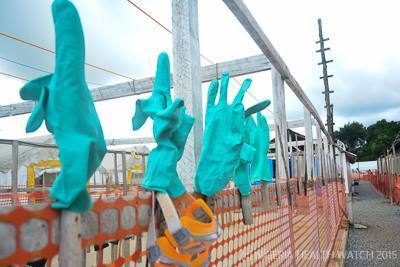26 February, Geneva – WHO Director-General Dr Tedros Adhanom Ghebreyesus today called on donors to continue funding the response to the Ebola outbreak in the Democratic Republic of the Congo or risk backsliding. There is an urgent need for US $148 million for all partners involved in the response to continue their work. So far, under US $10 million has been pledged.
The call comes a week ahead of Dr Tedros’ next mission to DRC. He is scheduled to meet President Tshisekedi in Kinshasa before travelling to the Ebola-stricken areas of Butembo and Katwa.
“The situation is unprecedented: there has never been an Ebola outbreak in these conditions, with such a highly mobile population and with many gaps in the health system .” said Dr Tedros.
“The security context is another major concern. I am deeply saddened by reports that a health facility run by Médecins Sans Frontières in Katwa was attacked on Sunday night. Nevertheless, together with partners and with the Democratic Republic of the Congo government in the lead, we have made major gains. Hundreds of deaths have been averted, maybe even thousands. But the outbreak is not over and we urgently need additional funding to see it through.”
Over 80,000 people have been vaccinated and over 400 have received treatment. Thousands of suspect cases have been monitored, tested and transferred to other centres once they were confirmed to not have Ebola. More than 40,000 contacts have been identified and reached daily for three weeks each to ensure they did not fall sick as well. WHO alone has shipped over 300 metric tons of supplies, including vaccination supplies and 470,000 sets of personal protective equipment for partners running treatment centres.
Alongside the response in the country, hundreds of health workers, border officers and other responders in neighbouring countries have been trained and prepared for a responding to a potential case.
Response partners have contained the outbreak in successive health zones, and prevented transmission to neighbouring countries, demonstrating that success is possible despite the difficult context. However, the on-going transmission in Butembo and Katwa, with the potential for the outbreak to reach into even more volatile and dangerous areas – where almost no partners could be able to operate. This is why support is needed now. Only if current actions are sustained and intensified will we be able to end this outbreak in the coming months.
The response plan for the period February to July, which brings together the planned actions and funding needs of all partners, was launched by the country’s health minister on 13 February. It anchors the response in local health system structures, strengthening the capacities of local responders, especially at provincial and local levels, and deepening the involvement of local communities, especially women’s groups and survivors.
“We have a shared responsibility to end this outbreak,” said Dr Tedros, adding that the continuing generous technical and financial support from the donor community is proof of the global commitment to stopping the outbreak. “We now need them to join us in the final push. No country or partner can face this deadly virus alone. The impact on public health and the economic ramifications can expand far beyond one country or continent. We promise we won’t relent until we’ve stopped this outbreak. But beating Ebola, wherever it may be, is expensive. It requires all of us to work together.”
